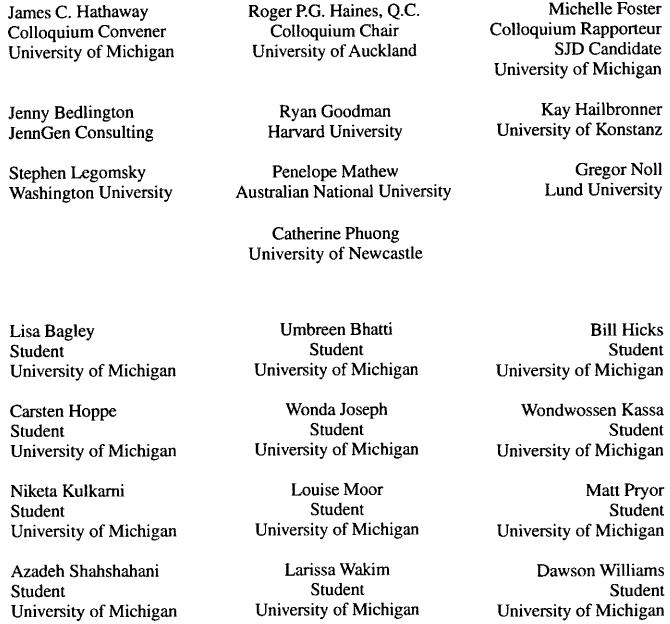Well-Founded Fear
Cite as: James C. Hathaway, The Michigan Guidelines on Well-Founded Fear, 26 Mich. J. Int’l L. 493 (2005).
THE MICHIGAN GUIDELINES ON WELL-FOUNDED FEAR
English / French / Russian / Arabic
Introduction
An individual qualifies as a Convention refugee only if he or she has a “well-founded fear” of being persecuted. While it is generally agreed that the “well-founded fear” requirement limits refugee status to persons who face an actual, forward-looking risk of being persecuted (the “objective element”), linguistic ambiguity has resulted in a divergence of views regarding whether the test also involves assessment of the state of mind of the person seeking recognition of refugee status (the “subjective element”). The view that the assessment of well-founded fear includes consideration of the state of mind of the person seeking recognition of refugee status is usually implemented in one of three ways. The predominant approach defines a showing of “fear” in the sense of trepidation as one of two essential elements of the well-founded fear test. In the result, refugee status may be denied to at-risk applicants who are not in fact subjectively fearful, or whose subjective fear is not identified as such by the decision-maker. A second view does not treat the existence of subjective fear as an essential element, but considers it instead to be a factor capable of overcoming an insufficiency of evidence of actual risk. Under this formulation, persons who are more timid or demonstrative, or who are simply able to articulate their trepidation in ways recognizable as such by the decision-maker, are advantaged relative to others who face the same level of actual risk, but who are more courageous, more reserved, or whose expressions of trepidation are not identified as such. A third understanding of a subjective element neither conditions refugee status on evidence of trepidation, nor advantages claims where such trepidation exists. The requirement to take account of “fear” is instead treated as a general duty to give attention to an applicant’s specific circumstances and personal vulnerabilities in the assessment of refugee status. We have engaged in sustained collaborative study and reflection on the doctrinal and jurisprudential foundations of the well-founded fear standard, and have concluded that continued reference to distinct “subjective” and “objective” elements of the well-founded fear standard risks distortion of the process of refugee status determination. The existence of subjective fearfulness in the sense of trepidation should neither be a condition precedent to recognition of refugee status, nor advantage an applicant who faces an otherwise insufficiently well-established risk. An approach which recognizes a subjective element in order to take account of an applicant’s circumstances and vulnerabilities does not pose protection risks of the kind associated with the first understanding of a subjective element, nor raise the unfairness concerns of the second approach. Reliance on a subjective element to particularize the inquiry into well-founded fear is, however, unnecessary, and may result in the devaluation of evidence of real value to the assessment of actual risk of being persecuted. These Guidelines are intended to promote a shared understanding of a unified approach to the well-founded fear inquiry and related aspects of the Convention refugee definition that both avoids the protection risks increasingly associated with assertions of a “subjective element,” and ensures that due regard is accorded all particularized risks faced by an applicant for recognition of refugee status.
Unable or Unwilling
1. An applicant’s state of mind is relevant to determining whether he or she “is unable or, owing to such fear, is unwilling to avail himself [or herself]” of the protection of his or her country or countries of citizenship or, in the case of a stateless person, country or countries of former habitual residence. Specifically, a state party’s duty of protection under the Convention is engaged through an expression by or on behalf of an applicant of inability or unwillingness to avail himself or herself of the protection of the relevant country or countries. 2. The required assertion of inability or unwillingness need not be made in any particular form. In substance, the applicant need only provide information or make claims which may engage the Refugee Convention obligations of the state.
Well-Founded Fear
3. In contrast to the question of whether an applicant is unable or unwilling to avail himself or herself of the country of origin’s protection, the assessment of well-founded fear does not comprise any evaluation of an applicant’s state of mind. 4. Most critically, the protection of the Refugee Convention is not predicated on the existence of “fear” in the sense of trepidation. It requires instead the demonstration of “fear” understood as a forward-looking expectation of risk. Once fear so conceived is voiced by the act of seeking protection, it falls to the state party assessing refugee status to determine whether that expectation is borne out by the actual circumstances of the case. If it is, then the applicant’s fear (that is, his or her expectation) of being persecuted should be adjudged well-founded. 5. An understanding of “fear” as forward-looking expectation of risk is fully justified by one of the plain meanings of the English text, and is confirmed by dominant interpretations of the equally authoritative French language text (“craignant avec raison“), which do not canvass subjective trepidation. This construction avoids the enormous practical risks inherent in attempting objectively to assess the feelings and emotions of an applicant. It is moreover consistent with the internal structure of the Convention, for example with the principle that refugee status ceases when the actual risk of being persecuted comes to an end, though not on the basis of an absence of trepidation (Art. 1(C)5-6), and with the fact that the core duty of non-refoulement applies where there is a genuine risk of being persecuted, with no account taken of whether a refugee stands in trepidation of that risk (Art. 33). More generally, the human rights context of the Convention requires that protection be equally open to all on the basis of evidence of an actual and relevant form of risk. 6. The determination of whether an applicant’s “fear”—in the sense of forward-looking expectation of risk—is, or is not, “well-founded” is thus purely evidentiary in nature. It requires the state party assessing refugee status to determine whether there is a significant risk that the applicant may be persecuted. While the mere chance or remote possibility of being persecuted is insufficient to establish a well-founded fear, the applicant need not show that there is a clear probability that he or she will be persecuted.
Establishing Well-Founded Fear
7. To determine whether an applicant faces a significant risk of being persecuted, all material evidence from whatever source must be considered with care, and in context. Equivalent attention must be given to all forms of material evidence, with a decision on the relative weight to be assigned to different forms of evidence made on the basis of the relative veracity and cogency of the evidence adduced. 8. Evidence unique to the applicant, including evidence of personalized and relevant past persecution, is directly relevant to the determination of well-founded fear, but is not a prerequisite. An applicant who, prior to departure from his or her country of origin, was not subject to persecution, nor directly threatened with persecution, can establish by other evidence a well-founded fear of being persecuted in the foreseeable future. 9. The assessment of well-founded fear may be based largely, or even primarily, on the applicant’s own credible testimony. While the applicant’s testimony is not necessarily the best evidence of forward-looking risk, it may well constitute the best evidence of risk, depending on the circumstances of the case. 10. In light of the shared duty of fact-finding, an applicant must make best efforts to provide the state party assessing refugee status with corroboration of his or her testimony. However, where such corroboration cannot reasonably be secured, an applicant’s credible and unrefuted testimony standing alone is sufficient to establish a well-founded fear of being persecuted. 11. An applicant’s testimony may only be deemed not credible on the basis of a specific, cogent concern about its veracity on a significant and substantively relevant point. 12. Even where there is a finding that an applicant’s testimony is not credible, in whole or in part, the decision-maker must nonetheless assess the actual risk faced by an applicant on the basis of other material evidence. In particular, the existence of a well-founded fear may be grounded in evidence that the applicant is a member of a relevant, at-risk group of persons shown by credible country data or the credible testimony of other persons to face a significant risk of being persecuted.
Being Persecuted
13. The particular circumstances of a person seeking recognition of refugee status are not relevant simply to the question of whether he or she can be said to have a well-founded fear. The determination of whether the risk faced is appropriately adjudged to amount to a risk of “being persecuted” also requires careful consideration of matters which may be unique to the individual concerned. 14. As a general rule, the determination of whether a given risk amounts to a risk of “being persecuted” must enquire into the personal circumstances and characteristics of each applicant, recognizing that by virtue of such circumstances and characteristics some persons will experience different degrees of harm as the result of a common threat or action. 15. Thus, for example, the psychological vulnerabilities of a specific applicant may be such that the risk of harms which would be insufficiently grave to justify recognition of refugee status for most persons will nonetheless amount to torture, cruel, inhuman or degrading treatment for him or her. Where this is so, the forward-looking risk of such psychological harms may appropriately be regarded as a risk of “being persecuted.” These Guidelines reflect the consensus of all participants at the Third Colloquium on Challenges in International Refugee Law, held at the University of Michigan Law School, Ann Arbor, Michigan, USA, on March 26-28, 2004.
The Colloquium deliberations benefited from the counsel of Mr. Christoph Bierwirth Senior Liaison Officer United Nations High Commissioner for Refugees, Geneva




